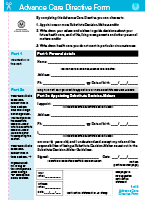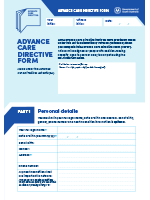An Advance Care Directive is a legal form that allows people aged 18 years and older with decision-making capacity to:
- write down their wishes, preferences and instructions for future health care, end of life, living arrangements and personal matters and/or
- appoint one or more Substitute Decision-Makers to make these decisions on their behalf when they are unable to do so themselves.
It cannot be used to make financial decisions.
If you have written a refusal of health care, it must be followed if relevant to the circumstances at the time. All other information written in your Advance Care Directive is advisory and should be used as a guide to decision making by your Substitute Decision-Maker/s, your health practitioners or anyone else making decisions on your behalf.
It is your choice to write an Advance Care Directive. No one can force you to have one or to write things you do not want. These are offences under the law.
You can change your Advance Care Directive at any time while you are still able by completing a new Advance Care Directive form (PDF 434KB).
Please note that existing completed Advance Care Directive forms remain legally valid and there is no requirement to update them using the redesigned form, published on 1 March 2024, unless you wish to update any information within your form. An Advance Care Directive form will replace all other documents you may have completed previously, for example an Enduring Power of Guardianship, Medical Power of Attorney or Anticipatory Direction.
This Advance Care Directive is not a will. It cannot be used to make financial decisions. It is recommended you think about appointing an Enduring Power of Attorney to make decisions about your future finance matters.
Improvements have recently been made to the Advance Care Directive legislation and materials, which incorporate feedback from the 2019 legislative review, the public, key stakeholders and the health sector.
Changes to legislation include:
- the revised list of who can be an authorised witness
- strengthened requirements on interpreters
- clear direction for health practitioners regarding the effect of an advance care directive containing binding refusals of health care in cases of suspected suicide or self-harm
- requirements for health care professionals relying on digital copies of Advance Care Directives
- rules around substitute decision-makers, such as appointing a ‘first preferred’ and
- the introduction of the use of digital signatures for Substitute Decision-Makers and interpreters.
Changes to the Advance Care Directive Form include:
- a new section to note any current health conditions
- the ability to appoint a ‘first preferred’ Substitute Decision-Maker
- the ability to appoint up to four Substitute Decision-Makers (old form allowed three) and the introduction of a new ‘Appointing additional Substitute Decision-Maker’ form, if you want to appoint more than four
- a new section about your preferences with organ donation and
- a new section to add an expiry date to your Advance Care Directive.
Changes to the new Advance Care Directive Kit include:
- a contemporary look and feel
- clearer and easier to understand
- more suggested statements under each section
- an updated step-by-step ‘do-it-yourself’ guide
- one Advance Care Directive Form (the old Kit had two).
The redesigned Advance Care Directive Kit is also now free (previously $5.00).
See the full list of collection points for an Advance Care Directive.
You can write an Advance Care Directive at any stage of life – whether you are young, older, healthy or unwell. To write an Advance Care Directive, it must be your choice and you must:
- be 18 years old or over
- know what an Advance Care Directive is
- know what it will be used for and,
- know when it will be used.
Your Advance Care Directive can only be used if you are unable to make your own decisions, whether temporarily or permanently.
If you cannot:
- understand information about the decision
- understand and appreciate the risks and benefits of the choices
- remember the information for a short time; and
- tell someone what the decision is and why you have made the decision.
It means you are unable to make the decision (sometimes called impaired decision making capacity) and someone else will need to make the decision for you.
The Advance Care Directives Act 2013 (SA) provides the legislative framework on how competent adults can complete an Advance Care Directive with assistance, particularly if the individual is unable to do so due to injury, illness or disability. Here are the key points:
- Capacity and consent: To complete an Advance Care Directive an adult must be able to understand what an advance care directive is and what it does.
- Assistance allowed: Section 11(2) of the Act permits a competent adult to receive assistance in completing an advance care directive. This assistance can include scribing or filling in the directive on behalf of the individual, especially if they are physically unable to do so themselves.
- Role of authorised witnesses: The Act requires authorised witnesses to be present when a person is signing their advance care directive. These witnesses attest that the person has decision-making capacity, understands the directive's contents, and is signing it voluntarily. There is also an ‘extra execution statement’ on page 11 of the advance care directive form if a person was required to sign the advance care directive on someone’s behalf due to injury, illness or disability.
- Conflict of interest: The Act prohibits individuals with a conflict of interest, such as health practitioners who are responsible for the health care of the person; family members who have a direct or indirect interest in the estate of the person making the advance care directive (i.e. a beneficiary of the person’s will); or persons in a position of authority in a hospital, hospice, nursing home or other facility, from unduly influencing or assisting in creating the advance care directive. This ensures that the directive accurately reflects the person's own wishes.
- Professional guidance: While not mandatory, seeking professional guidance from legal or health care professionals can be beneficial, especially for the binding refusals section of the form, or if there are uncertainties about the process.
It is your choice if you appoint one or more Substitute Decision-Makers. If you have appointed one or more Substitute Decision-Makers, they will be able to legally make decisions for you about your health care, living arrangements and other personal matters when you are unable to. You can also specify the types of decisions you want them to make in the Conditions of Appointment Part 2b of your Advance Care Directive form (PDF 434KB).
If you do not appoint any Substitute Decision-Makers, others close to you may be asked to make decisions for you if you are unable to (Person Responsible). They must follow any relevant wishes or instructions you have written in your Advance Care Directive.
Anyone making a decision for you will need to make a decision they think you would have made in the same circumstances.
If you have already completed an Enduring Power of Guardianship, a Medical Power of Attorney or an Anticipatory Direction, these will continue to be legally effective, unless you complete the new Advance Care Directive form (PDF 434KB).
Yes. Any Advance Care Directive made on the previous form continues to be and will remain legally valid. There is no requirement to replace your current Advance Care Directive on the new form, unless you need to update it.
Below is an image of the previous form and the current form.


If you want to update your existing document/s, or make a new Advance Care Directive, you must use the new Advance Care Directive form (PDF 434KB).
You may have written in your Advance Care Directive that you do not want certain types of health care, also known as a binding refusal of health care. It is important to make sure you have written down when or under what circumstances any refusals of health care apply.
If you have refused specific health care in your Advance Care Directive, your Substitute Decision-Maker/s or Person Responsible and your health practitioner must follow those refusal/s if it is relevant to the current circumstances.
This means that your health practitioner will not be able to give health care treatment you have refused.
If you refuse health care but do not write down when the refusal applies, it will apply at all times.
A health practitioner can only override a refusal of health care if there is evidence to suggest you have changed your mind but did not update your Advance Care Directive, or the health practitioner believes you didn’t mean the refusal of health care to apply in the current circumstance; and if the health practitioner has reasonable grounds to suspect self-harm.
If this happens they will need consent from your Substitute Decision-Makers, if you have any, or a Person Responsible, to provide any health care.
You cannot refuse compulsory mental health treatment as listed in a community or involuntary treatment order if you have one.
If you would like further information contact:
Legal Services Commission
Telephone: 1300 366 424
Email: news@lsc.sa.gov.au